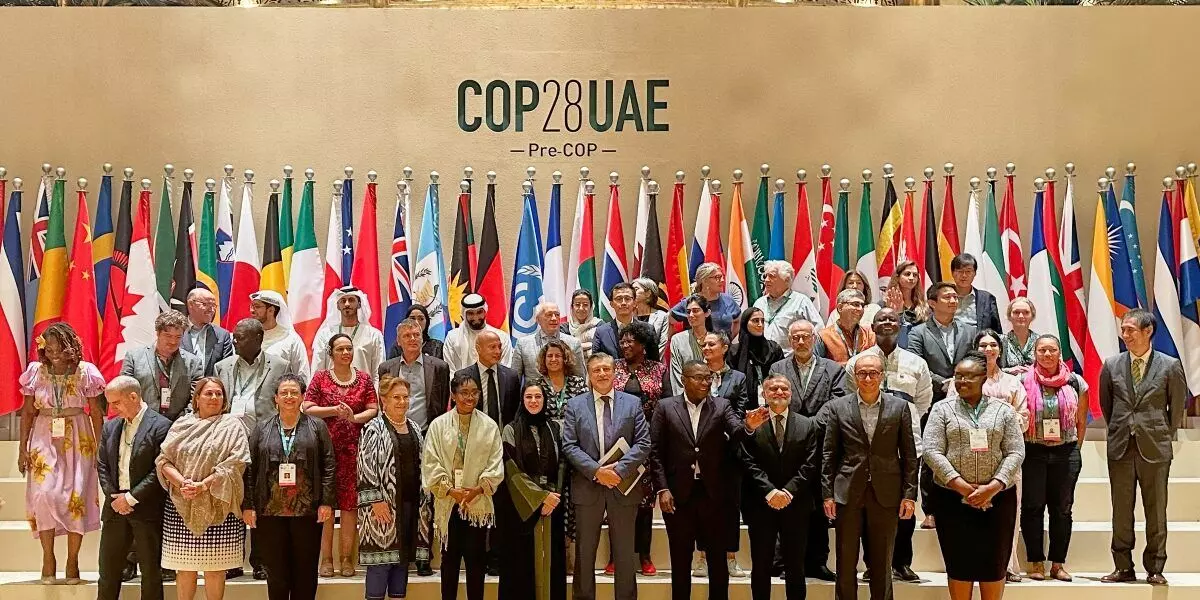Much ado about nothing
A fragmented approach, disinterest of global leaders, and glaringly inadequate facilitation of climate funds persisted at the COP28 — hindering any substantial progress

The CoP meetings held annually have become like mini-Kumbha melas, with large-scale attendance from government delegations and other participants representing different institutions, NGOs, the private sector, different interest groups, and lobbies. Over 70,000 participants attended CoP28. According to the Kick Big Polluters Out (KBPO) coalition, the number of fossil fuel lobbyists (2,456) who attended the conference outnumbered those from the 10 most vulnerable countries (1,509).
In response to criticism over this, the CoP28 President clarified that they wanted the conference to be inclusive by giving dedicated spaces for all voices to be heard. Many world leaders who address the CoP meetings make inspiring speeches and reiterate their commitment to climate action. But once back home, it’s business as usual. The heads of two of the biggest polluting countries, US President Joe Biden and Chinese President Xi Jinping, gave the summit a miss. Although Russian President Vladimir Putin made a flying visit to the UAE, it is not clear whether he addressed the CoP gathering. Prime Minister Narendra Modi, who addressed the UN Climate Summit, reiterated India’s commitment to climate action and emphasised the need for climate finance and technology to help developing countries adapt to climate change.
Although India’s climate action plan assigns importance to renewable energy and forest conservation, it is lamentable that, despite widespread criticism from the opposition and environmentalists, the government has relaxed India’s forest and environmental laws to facilitate the easy diversion of forests for non-forest uses. The conference witnessed contentious negotiations between developed and developing countries, between fossil fuel producing and consuming countries and others, between vulnerable small island developing countries and others, between fossil fuel lobbies and environmental lobbies. While developed countries insisted on making a declaration on phasing out fossil fuels, oil-producing countries led by Saudi Arabia and fossil fuel-dependent economies such as India were against the move. India’s opposition to including methane emission cuts as part of each country’s national determined commitments (NDCs) and focusing only on the phase-out of coal was accepted by the climate summit.
India reiterated that global climate actions should be based on the principle of common but differentiated responsibilities (CBDR), and developing countries should get a fair share of the remaining carbon space for development. The 28th Conference of Parties (CoP28) to the United Nations Framework Convention on Climate Change (UNFCCC), which met in Dubai from November 30 to December 12, 2023, issued a declaration on climate, relief, recovery, and peace. The declaration called for bolder collective action to build climate resilience at the scale and speed required in highly vulnerable countries and communities, particularly those facing fragility, conflict, or severe humanitarian needs, many of which are least developed countries and small island developing states.
While some deemed the meeting’s outcome a success, others found it disappointing and a failure. UN Secretary General Antonio Gutterres, in his concluding statement at the CoP28, expressed his disappointment at the watered-down declaration on phasing out fossil fuels. He noted that: “To those who opposed a clear reference to a phase out of fossil fuels in the CoP28 text, I want to say that a fossil fuel phase out is inevitable, whether they like it or not. Let’s hope it doesn’t come too late. The era of fossil fuels must end, and it must end with justice and equity.” A news report exclaimed that yet another UN jamboree has ended with another wishy-washy climate deal. The International Energy Agency estimates that new global upstream oil and gas investments would increase to USD 528 billion in 2023, the highest level since 2015.
The UK, which had pledged to ban sales of new petrol or diesel vehicles by 2030, has now extended the deadline to 2035 due to the low poll ratings of the Conservative government headed by Rishi Sunak. The return of Donald Trump as the next US President, as predicted by most public opinion polls, will jeopardise the climate deal, with a Trump administration likely to withdraw from the Paris Climate Agreement once again. The CoP28 meeting finally agreed on a roadmap for a transition away from fossil fuels in energy systems, commitments to triple renewable energy capacity and double energy efficiency by 2030, and make progress towards adaptation and finance. It published the first global stocktake, which showed that based on current NDCs, the world will miss the goal of limiting global temperature rise to 1.5 degrees Celsius above pre-industrial levels by 2050.
A UN report notes that predicted greenhouse gas emissions should be cut by 42 per cent by 2030. The developed countries have failed to keep up their pledge affirmed at the Paris Climate Summit in 2015 to mobilise climate finance of USD 100 billion per year to assist developing countries in adapting to climate change. A notable achievement of the CoP28 summit was the operationalisation of the Loss and Damage Fund decided at the CoP27 meeting held in Egypt in November 2022. The World Bank will host this fund. The UAE, Germany, and France each pledged USD 100 million to the fund. Totally, the fund garnered pledges of around USD 800 million. The USA committed just USD 17.5 million for the fund, whereas it approved military aid worth USD 14.5 billion for Israel and USD 200 million for Ukraine.
Funds mobilised under this facility are grossly inadequate, with the projected losses due to natural disasters incurred by developing countries estimated at over USD 400 billion in 2023, which will rise to over USD1.8 trillion by 2050. One wonders how committed our leaders are to translating these decisions into action.
Views expressed are personal




